| Srl | Item |
| 1 |
ID:
139268
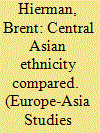

|
|
|
|
|
| Summary/Abstract |
In this article, I utilise a contextual understanding of ethnicity and unique data to demonstrate that the ethnic Uzbek identity category is both widely available and frequently a useful means of making sense of the world in both Kyrgyzstan and Tajikistan. While Uzbek ethnicity is generally salient in both states, the context in which it becomes so varies across space. In particular, there are significant urban–rural distinctions that affect when Uzbek ethnicity is utilised to interpret the world. In addition, compared to others, rural Tajikistani Uzbeks perceive that the boundary between Uzbeks and the titular groups is particularly permeable.
|
|
|
|
|
|
|
|
|
|
|
|
|
|
|
|
| 2 |
ID:
139269
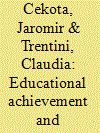

|
|
|
|
|
| Summary/Abstract |
This article investigates the educational attainment, employment and living conditions of young Roma adults in Bulgaria, Hungary and Romania with the aid of national generations and gender surveys and other sources of information. It shows that in spite of a small improvement in the educational attainment of young Roma in comparison to the generation of their parents, the educational achievement and employment gaps have increased considerably during the post-communist period. The article also compares living conditions of the Roma with other population groups. It concludes with a discussion of policy challenges.
|
|
|
|
|
|
|
|
|
|
|
|
|
|
|
|
| 3 |
ID:
139270
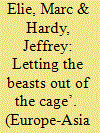

|
|
|
|
|
| Summary/Abstract |
After a lapse of 15 years under Stalin, parole was reintroduced into the Soviet Gulag in 1954. For justice officials anxious to expunge Stalin's repressive legacy, the resurrection of parole signalled a return to correctionalism, societal oversight over the Gulag, and a vastly reduced rate of incarceration. In practice, though, parole exposed significant continuities with the Stalinist Gulag, including endemic corruption, overwhelming concern with production, suspicion of outside interference in penal affairs, and constant upward pressure on the inmate population. In the broader view, the experience of parole in the post-war USSR aligned closely with that of the Western world.
|
|
|
|
|
|
|
|
|
|
|
|
|
|
|
|
| 4 |
ID:
139273
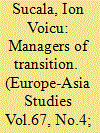

|
|
|
|
|
| Summary/Abstract |
The article presents the perspectives of managers as part of the Romanian organisational elite on the communist regime and on the transition period, and the values and principles that informed their behaviour as managers in each period. For the first decade after the end of communist rule, managers were drawn mainly from the second level of management of the state-owned enterprises of communist times. As a group they had been selected and formed in late communism. Among the main advantages of this social group were that they demonstrated considerable survival capacity, ideological neutrality and an ability to manoeuvre in a turbulent environment. On the other hand they had to adapt to their new environment drawing on the skills and mentality they had developed under the old regime. The research employed a qualitative method based on the interpretation of conversations between managers and students.
|
|
|
|
|
|
|
|
|
|
|
|
|
|
|
|
| 5 |
ID:
139271


|
|
|
|
|
| Summary/Abstract |
Based on fieldwork done in Ekaterinburg, this article deals with the enforcement of legal decisions about economic disputes in the late 2000s in Russia. As state employees, bailiffs are responsible for the implementation of court decisions but their efficiency depends on the cases they deal with. In the most successful cases, they are backed by private enforcers, hired by the claimant and often coming from the law enforcement agencies. This common work reflects an informal public–private partnership from below in which bailiffs and private enforcers co-execute judicial decisions. Such autonomous public–private power configurations at local level challenge the governmental claim to build a ‘power vertical’ in Russia from the top.
|
|
|
|
|
|
|
|
|
|
|
|
|
|
|
|
| 6 |
ID:
139272
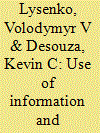

|
|
|
|
|
| Summary/Abstract |
Information and communication technology have played an important role in the tactics of uprisings against non-democratic regimes worldwide. However, there has been little attention paid in studies so far of how authorities in those countries employ such information and communication technology. In this article we examine the evolution of such tactics as employed by one of the most ingrained authoritarian regimes—that of Belarus—during the decade 2001 to 2010. The political opposition's responses to the authorities' countermeasures are also investigated, followed by an analysis of the co-evolution of these opponents' tactics.
|
|
|
|
|
|
|
|
|
|
|
|
|
|
|
|